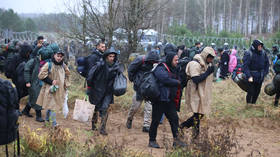Latvia warns that NATO could be brought in to ‘defend’ EU’s border with Belarus
Latvia has cautioned that NATO could be called in to help protect the EU’s eastern border amid a rapidly escalating migrant crisis, with Brussels having accused Belarus of flying in refugees as part of a “hybrid war” campaign.
Speaking to local radio on Thursday, Defense Minister Artis Pabriks said that if Belarusian leader Alexander Lukashenko chooses to worsen the situation, then “I cannot rule out that even NATO could become involved, because we must defend our borders and will not open them.”
According to him, the ongoing crisis should strengthen the EU’s resolve to build fortified fences along the border with the eastern European nation. In a broadside against the European Commission, he argued that officials were reacting “very slowly” to the stand-off. “If a way to respond faster isn’t found, the people of Europe will take a much dimmer view of the future potential of the EU,” he continued.
The row over the shared frontier has worsened in recent days, with neighboring Poland declaring a state of emergency and deploying thousands of troops, border guards, and police officers in response to a spike in attempted illegal crossings. Warsaw alleges that Belarusian officials are encouraging the crowds to reach the demarcation line, and using force to prevent them from turning back.
Officers deployed pepper spray and riot shields earlier this week to prevent groups of would-be asylum seekers reaching Poland. Several people are reported to have died on the Belarusian side of the border, having been forced to sleep rough in cold weather while attempting to get to safety.
Brussels is reportedly considering a package of economic measures, including against airlines it claims are responsible for ferrying desperate people to Minsk from troubled nations like Iraq, Syria, and Iran.
Lukashenko denies the claim that the worsening situation is retribution for EU sanctions, and has said his government is simply no longer prepared to stop refugees reaching the border.
According to him, the crisis is one of the West’s own making, after years of foreign intervention. “What are people to do? They will go to Europe,” he insisted.
Like this story? Share it with a friend!














